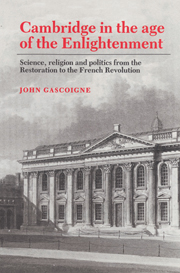 Cambridge in the Age of the Enlightenment
Cambridge in the Age of the Enlightenment Despite recent attempts (Porter, 1981; A. M. Wilson, 1983; Pocock, 1985a) to lay claim to the Enlightenment as being, at least in part, English territory, the conjunction of the terms ‘English’ and ‘Enlightenment’ still seems almost a solecism: no less an historian than R. R. Palmer has gone so far as to write that ‘the term “English Enlightenment”, would be jarring and incongruous if it were ever heard’ (1976: 608). Was not the Enlightenment essentially a French phenomenon, albeit with pale reflections in Germany and Scotland and even paler reflections elsewhere? In any case what need had eighteenth-century England of an enlightenment when it had achieved many of the goals for which the French philosophes were striving? Influential accounts of the Enlightenment such as those by Hazard or Gay concede the importance of such major English thinkers as Bacon, Newton or Locke in the prehistory of the movement and cite examples drawn from eighteenth–century England, but their views of the Enlightenment are largely framed in terms of debates within France. Since in France the clash between the philosophes and a powerful and privileged ecclesiastical establishment assumed special significance, they emphasise the anti-clerical and even irreligious character of the Enlightenment (Gilley, 1981) – what Hazard (1965) refers to as the phenomenon of ‘Christianity on trial’ and Gay terms ‘The rise of modern paganism’ (1970).
To save this book to your Kindle, first ensure no-reply@cambridge.org is added to your Approved Personal Document E-mail List under your Personal Document Settings on the Manage Your Content and Devices page of your Amazon account. Then enter the ‘name’ part of your Kindle email address below. Find out more about saving to your Kindle.
Note you can select to save to either the @free.kindle.com or @kindle.com variations. ‘@free.kindle.com’ emails are free but can only be saved to your device when it is connected to wi-fi. ‘@kindle.com’ emails can be delivered even when you are not connected to wi-fi, but note that service fees apply.
Find out more about the Kindle Personal Document Service.
To save content items to your account, please confirm that you agree to abide by our usage policies. If this is the first time you use this feature, you will be asked to authorise Cambridge Core to connect with your account. Find out more about saving content to Dropbox.
To save content items to your account, please confirm that you agree to abide by our usage policies. If this is the first time you use this feature, you will be asked to authorise Cambridge Core to connect with your account. Find out more about saving content to Google Drive.